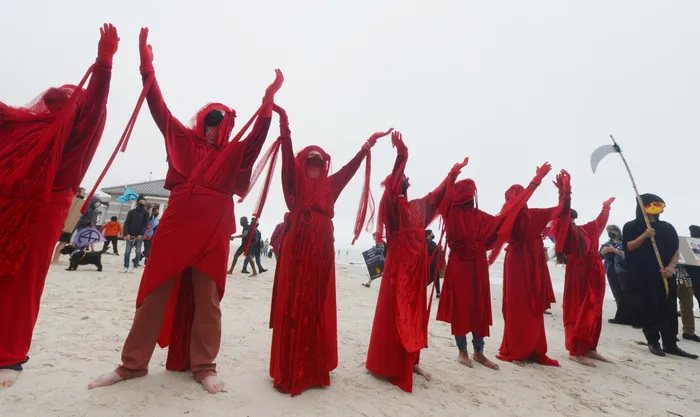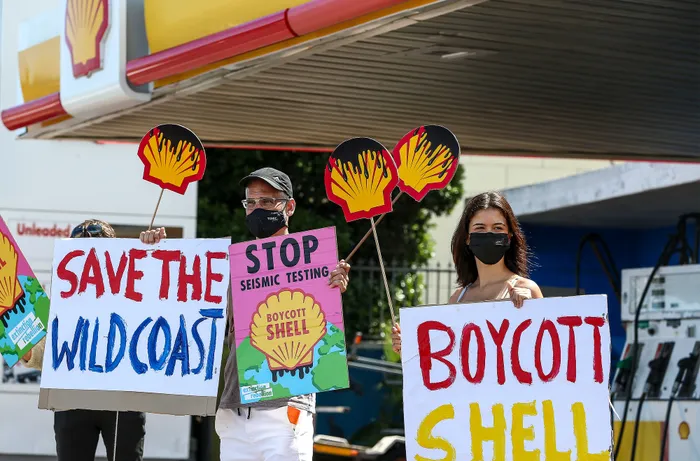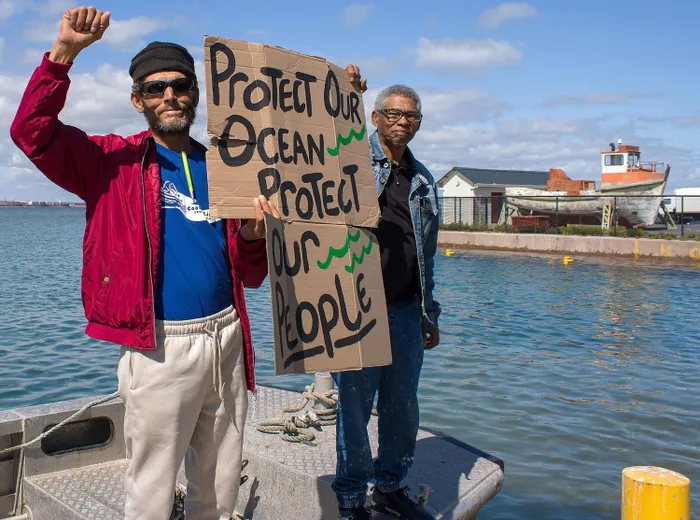
The seismic exploration has been a fight for years. Pictured is the grim reaper on the beach
Image: Armand Hough
Just weeks after conservation groups and small-scale fishers celebrated a landmark court victory, the fight to protect South Africa’s coastline faces a new challenge. The State and Shell have filed applications for leave to appeal the Western Cape High Court ruling that overturned approval for offshore oil drilling along the province’s coast.
On 13 August, Judge Mangcu-Lockwood found serious flaws in the environmental assessment that underpinned the government’s decision to grant environmental authorisation for drilling in Block 5/6/7. The court sided with The Green Connection and Natural Justice, who argued that the risks of oil spills, climate change, and socio-economic impacts on coastal communities were inadequately considered.
The ruling sent the matter back to the Department of Mineral Resources and Petroleum for a fresh decision. Any new approval would require TotalEnergies EP South Africa (Teepsa), which originally held the licence but intended to transfer it to Shell, to submit updated assessments examining the full lifecycle climate impacts, socio-economic risks to communities, cross-border effects on Namibia, and detailed oil spill response plans. All information must also undergo public consultation.
Meanwhile, conservationists learned that both the Minister and Director General of Mineral Resources and Energy, along with Shell, are challenging the judgment, seeking permission to appeal either to the Supreme Court of Appeal or a full bench of the High Court.
“While this is disappointing, we are hopeful that the High Court will uphold its ruling, which was a big win for human rights and climate justice, especially for those who are likely to be most affected,” said Shahil Singh, Legal Advisor to The Green Connection.
“Not making updated Oil Spill and Blowout Contingency Plans available to the public until after environmental approval, violated people’s right to comment on emergency preparedness, and this was a key reason behind the ruling.
From a legal standpoint, precaution and transparency must prevail, to guarantee justice for the coastal communities and small-scale fishers who refuse to be sidelined in decisions that affect their livelihoods and the future of our oceans.”
While the State and Shell argue the Court misapplied the law, The Green Connection and Natural Justice insist the ruling is sound and consistent with the Constitution. The Department of Forestry, Fisheries and the Environment has opted not to appeal, filing a Notice to Abide. The High Court will now decide whether to grant leave to appeal. If refused, applicants may still petition higher courts, but until any appeals are finalised, the 13 August ruling remains binding.

A handful of people brandished placards in front of a Shell garage protesting against the company.
Image: Leon Lestrade
On the other side of the country, the stakes could not be higher. With roughly 90% of South Africa’s oceans already leased for potential oil and gas projects, the risk to coastal communities, marine life, and tourism is real and immediate.
Neville van Rooy, Community Outreach Coordinator at The Green Connection, warned: “The supposed economic benefits are often exaggerated to gain community buy-in, while the environmental damage and the cost to coastal communities could be irreversible. Those living closest to the sea who depend on it for food and income will be the first and worst affected.”
The danger is far from theoretical. The MV Ultra Galaxy disaster in mid-2024 spilled over 500 tons of oil across a 40 km stretch near Doring Bay.
“Local fishers from Papendorp and Ebenhaeser reported no catches for weeks. The water was discoloured and smelled strongly of oil making food security and income impossible,” Van Rooy recalled. Masifundise and Coastal Links noted the long-term trauma this caused to communities whose livelihoods depend on the sea.
“When we weigh the pros and cons, the numbers just don’t add up. A 20% increase in oil and gas activity would barely lift GDP in the short term at just 0.15% but could harm growth in the long run,” said Van Rooy.
Lauren van Nijkerk, WILDTRUST Campaigns Director, said: “Operation Phakisa, which means ‘hurry up,’ was South Africa’s idea of pushing for a Blue Economy, but assumes the ocean is just there for economic gain. It doesn’t take into account its inherent value in heritage, culture, ecosystem services, tourism, and the fact that it feeds thousands of families.”
Legal challenges are exposing cracks in the push for offshore drilling. Past cases, like Sustaining the Wild Coast, confirmed that proper consultation and respect for cultural rights are constitutional obligations.
The Green Connection and Natural Justice argued that exploration in the Deep-Water Orange Basin ignores climate goals, economic realities, and basic rights to a healthy environment.
Meanwhile, sustainable ocean sectors like small-scale fisheries and tourism already provide more jobs with stable income and far greater social value.

Walter Steenkamp (left), a small-scale fisher from Port Nolloth protesting against the drilling expedition
Image: Supplied
Small-scale fisher Walter Steenkamp put it plainly: “From the day drilling starts, the risk is there. Spills and pollution can happen immediately or years later. And before they even start, what about seismic blasting? Will it scare off the fish we depend on? Will it affect their breeding and feeding habits? We just cannot risk it. Too many lives are at stake.”
The Green Connection warned that South Africa risks repeating the “resource curse,” where extractive industries enrich a few elites while communities bear the environmental and social costs.
“For South Africa, offshore oil and gas represent an economic illusion,” said Liziwe McDaid, Strategic Lead at The Green Connection.
“While some nations may have built wealth on fossil fuels in the past, in the context of the climate crisis, this is no longer viable. Government and industry must stop clinging to the myth of fossil fuel prosperity, and instead invest in renewable energy, sustainable fisheries, and tourism. This is how we protect the environment that sustains us and ensure meaningful economic growth.”
In response to the appeal, TotalEnergies EP South Africa (TEEPSA) said it noted that Shell Exploration and Production South Africa, the Minister of the Department of Mineral Resources and Energy, and the Minister of the Department of Forestry, Fisheries and the Environment have all filed applications for leave to appeal.
TEEPSA explained that it did not file an appeal authorisation request concerning Block 5/6/7 and reiterated that it announced its exit from Block 5/6/7 back in July 2024.
“Shell Exploration and Production South Africa is now the operator of the block. TEEPSA reiterates that, from the outset of the exploration project, the Block 5/6/7 joint venture complied with all required local regulations, in particular environmental and social, as evidenced by the granting of the Environmental Authorisation by the Department of Mineral Resources and Energy in April 2023, and its confirmation by the Minister of the Department of Forestry, Fisheries and the Environment in September 2023,” TEEPSA explained.